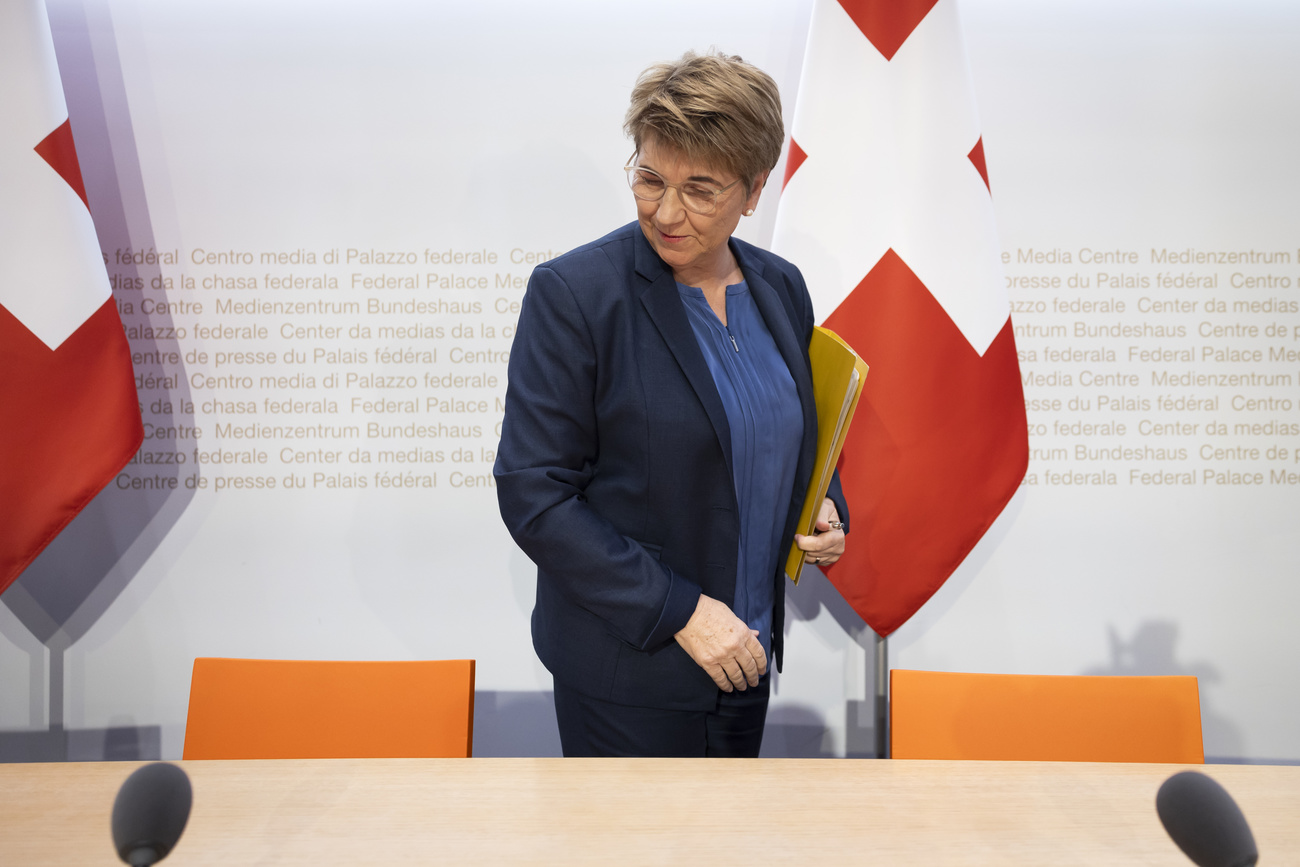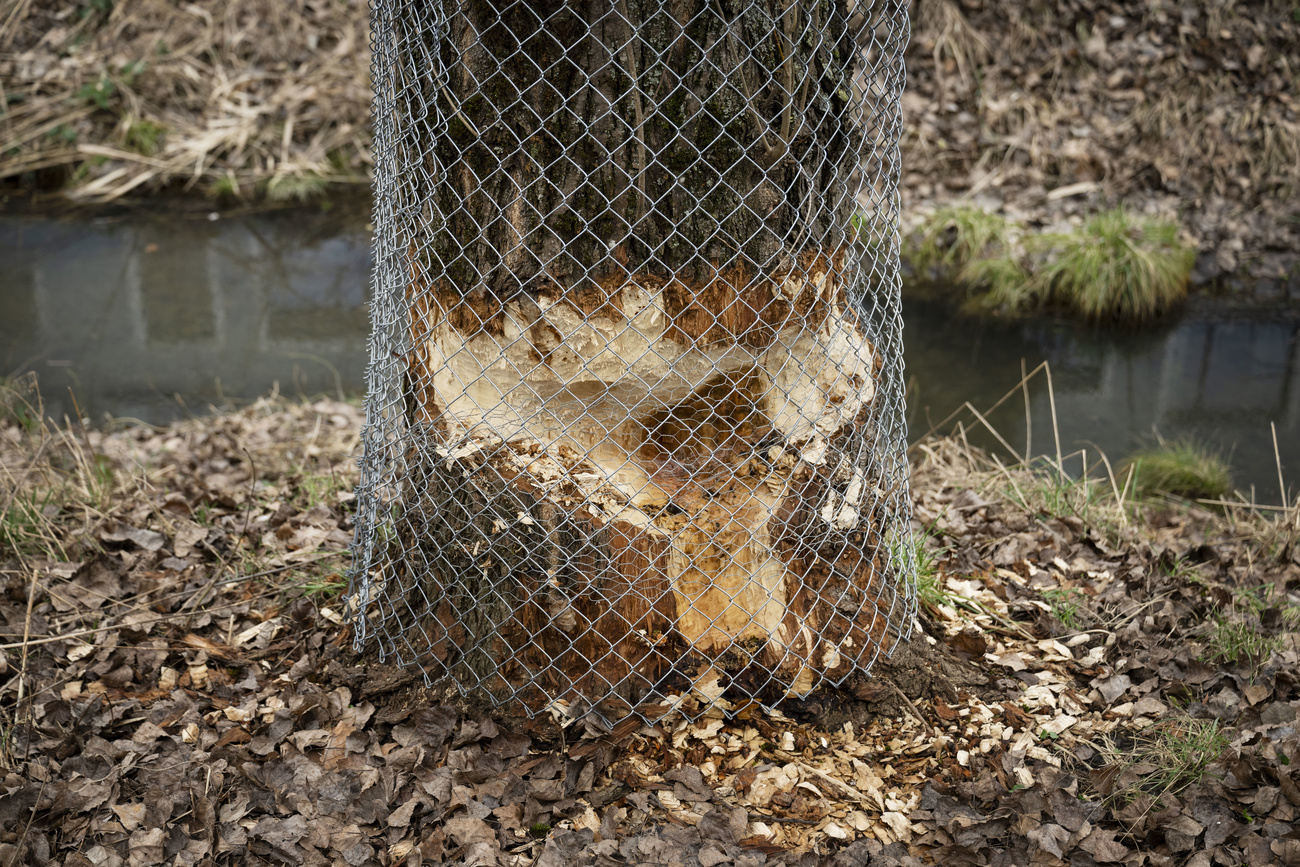

The Week in Switzerland
Dear Swiss Abroad,
This week’s highlight in Switzerland is the announcement of Defence Minister Viola Amherd's resignation, effective at the end of March.
In addition to this major political news, military affairs take centre stage in our weekly update. We also bring you encouraging news for those facing debt challenges and some troubling updates regarding Switzerland's beavers.
Enjoy your reading.
The big stories of the week

Viola Amherd to step down as defence minister
Viola Amherd, who has led the defence ministry since January 1, 2019, announced her resignation on Wednesday. This coincided with a press conference on increasing the proportion of women in the army.
Her resignation, anticipated for some time, comes at the end of her presidential year. Recently, she faced mounting pressure, including an unusual public call for her resignation from the Swiss People’s Party.
Amherd’s most notable achievement was leading the campaign for the purchase of new fighter jets, narrowly approved by the Swiss public. However, mismanagement of projects such as the acquisition of six Israeli reconnaissance drones attracted criticism. Her efforts to align the Swiss Army more closely with NATO also angered conservative factions.
Attention has now shifted to her potential successor, with Gerhard Pfister emerging as a leading candidate. Recently, he stepped down as president of the Centre Party, to which Amherd belongs, and has signalled interest in joining the Federal Council. The Centre Party will begin its selection process on Monday.
- Who will succeed Viola Amherd? Watson explainsExternal link (in French)
- Follow-up to Viola Amherd’s resignation on Swiss public television, RTSExternal link (in French)

Ten years since Switzerland abandoned the euro floor rate
Exactly ten years ago, on January 15, 2015, the Swiss economy experienced a real shock when the Swiss National Bank (SNB) abandoned the euro floor rate. This measure was designed to maintain stability between the franc and the euro, with a threshold of €1 for CHF1.20. This decision, aimed at stabilising the export-driven economy, initially caused upheaval, including a stock market dip and widespread criticism.
It had abrupt consequences, including a sharp fall in the leading stocks on the Swiss stock exchange. Business circles expressed anger and incomprehension at the decision. At the time, Swatch Group CEO Nick Hayek described it as a “tsunami for the whole of Switzerland”. Yet, the Swiss economy quickly rebounded, with the export sector adapting and returning to growth.
Ten years on, it is clear that the Swiss economy has held up very well once the initial shock has passed. “The abolition of the minimum exchange rate was a very courageous and correct measure. The results speak for themselves,” says Fredy Hasenmaile, chief economist at Raiffeisen Switzerland.
The abandonment of the floor rate had been accompanied by negative interest rates, the lowest in the world. Rates were finally reduced to 0% in June 2023. However, given the strong franc and declining inflation, a return to negative rates remains a possibility. This is an option that remains open to the SNB, which already cut rates sharply last year. Most experts say this measure should not be reintroduced, barring a major economic or political crisis.
- A review of the ten-year anniversary of the abandonment of the floor rate on the Swiss public television, RTSExternal link website (in French)
- Read the article on SWI swissinfo.ch (in French)
![[Symbolic Image, Staged Picture] A Caritas debt advisor, left, and a female client, right, during a debt councelling meeting a Caritas councelling office in Lucerne, Switzerland,](https://www.swissinfo.ch/content/wp-content/uploads/sites/13/2025/01/344908999_highres.jpg?ver=5bef24b1)
New debt relief measures proposed by the Federal Council
The Swiss federal government wants to offer over-indebted people a “second chance”. At its weekly meeting, the government presented new restructuring procedures. But they come with strict conditions attached.
In Switzerland, it is currently very difficult, if not impossible, to escape the spiral of over-indebtedness. It’s a stone around your neck that you usually carry for the rest of your life. Currently, those in serious financial difficulty cannot legally write off their debts, making Switzerland an exception in Europe.
Under the proposed law, individuals unable to repay their debts could declare bankruptcy and clear their financial slate. But there are conditions. For three years, indebted people will have to use all their assets in excess of the subsistence minimum to repay their debts and prove that they are making efforts to earn a regular income. If these commitments are met, the balance of the debts will be written off at the end of the three years.
Debt advisor organisations have long been calling for a mechanism to get people out of debt. Authorities estimate that between 2,000 and 10,000 people could benefit from this annually. However, debtors cannot repeat the process for ten years.
- Full explanation of the new debt relief mechanism on Swiss public television, RTSExternal link (in French)
- From our archives: in 2019, this SWI swissinfo.ch article took stock of the debt problem in Switzerland (in English)

Beavers under threat as new culling rules take effect
Times are hard for Switzerland’s protected animals. After recent challenges to the wolf population, Switzerland’s beavers may also face increased risks. The Swiss federal government announced that from February 1, beavers can be culled if they cause excessive damage, provided all other preventive measures have failed.
Conservationists have criticised these new regulations and launched a petition titled “No unnecessary beaver shooting!”
Once hunted to extinction in Switzerland for its fur, meat and castoreum, the beaver had completely disappeared from Switzerland by the early 19th century. Beavers were successfully reintroduced in the 1950s and their numbers have since grown to about 5,000, mainly in the Alpine valleys and Plateau regions.
- The full article on SWI swissinfo.ch (in English)
- Article in Le MatinExternal link on the petition (in French)
Quirky Switzerland

Tourists visiting Switzerland are sometimes surprised to see soldiers in camouflage on trains or in restaurants. This is likely to become even more frequent, as the Swiss army foresees a future almost exclusively in combat dress.
On January 7, the Swiss Armed Forces said it had decided to stop issuing a service uniform – a smarter look which includes a blazer, shirt, belt, trousers and tie – to all troops. The decision was implemented with immediate effect to save money. No service uniforms were issued at the winter recruit school, which began earlier this week.

More
Weapons or uniforms? The cost-cutting Swiss army has chosen
Photo of the week

Swiss political life resumed with the year’s first Federal Council meeting, chaired by Karine Keller-Sutter, who holds the rotating Swiss presidency this year.
The week ahead

There will be a lot of talk about the economy next week at the World Economic Forum in Davos, which takes place from January 20 to 24.
It will also be a highly political event, with the presence of European Commission President Ursula von der Leyen, Ukrainian President Volodymyr Zelensky and six of Switzerland’s seven Federal Council members are expected to attend, alongside a video address from Donald Trump, who takes office as US President on Monday.
In Swiss politics, the succession of Viola Amherd promises a gripping few weeks, with the Centre Party starting its selection process on Monday.
On the cultural front, the 60th Solothurn film festival, kicks off on Wednesday.
Translated from French using DeepL/amva

In compliance with the JTI standards
More: SWI swissinfo.ch certified by the Journalism Trust Initiative






























